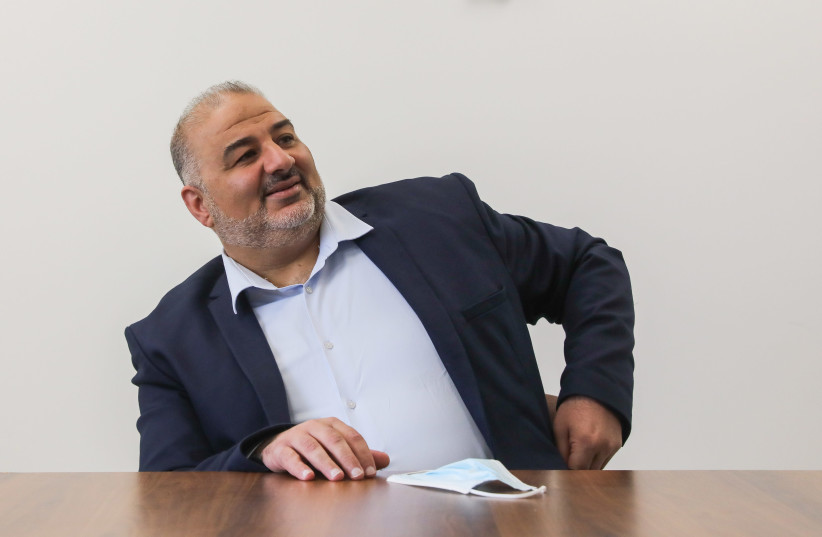On Monday, Ra’am (United Arab List) MK Mazen Ghanaim met with the leader of the Northern Branch of the Islamic Movement, Sheikh Raed Saleh, soon after Raed was released from prison after serving 16 months of a 28-month sentence for inciting terrorism.
The next day, Ra’am’s leader, Mansour Abbas, broke with the decades-long position held by the country’s Arab parties and said, “The State of Israel was born as a Jewish state, and it will remain so.”
In the words of the long-running American television game show To Tell the Truth, “Will the real Ra’am please stand up?” In To Tell the Truth, four celebrity panelists try to ferret out which of three contestants claiming to be a particular person is indeed that person, and which of them are impostors. So, in the spirit of that show, which MK represents the real Ra’am, Ghanaim or Abbas?
Is Ra’am an Arab party like all others which – as Ghanaim’s meeting with Saleh would indicate – sees the Jewish state as illegitimate, a passing episode bound to eventually disappear? Or is it a trailblazing Arab party that – in the interest of furthering the material interests of the country’s Arab minority – both recognizes and accepts the reality that Israel is a Jewish state that is here to stay, and then works with that state for the benefit of its constituents?
The truth is that Ra’am incorporates within it both elements, and this dichotomy is reflective of a tug-of-war going on not only within the party, but within the Arab-Israeli community as a whole regarding its relationship toward the state.

Most Jewish Israelis are hoping that Abbas’s line is the one that eventually wins out, and that he can overcome those forces in his party, and they are not insignificant, who want to see Ra’am return to the anti-Israel positions represented by Saleh and articulated by members of the rival Arab party, the Joint List.
In stark contrast to Abbas’s groundbreaking comments on Tuesday, Joint List MK Ahmad Tibi resorted to the same old, same old, when he rejected his former Joint List colleague’s comment, telling KAN Bet that an “Arab Palestinian leader should not speak like this.”
Tibi said that Israel should be a democratic country, not a “Jewish democratic” country, which he termed an “oxymoron.”
For Abbas’s path to win out over Tibi’s and Ghanaim’s, it needs to be encouraged. It also needs to produce results for the Arab community.
Up until now, the seven Jewish parties in the eight-party coalition have understood this, which is why they approved a budget that includes a historic NIS 32 billion allocation to the Arab sector. Their hope was that the Arab sector will see that Mansour’s path bring results, while those Arab politicians whose whole raison d’être seems to be simply blasting Israel and complaining about how unjust and unequal it is, while advocating for the Palestinian Authority, have nothing concrete to show for their efforts.
This is why those same Jewish parties in the coalition need to tread carefully in dealing with Ghanaim. According to a KAN Bet report, in recent days senior officials in Yamina have let Abbas know that incidents such as the Ghanaim-Saleh meeting are unacceptable, and that he needs to “make order in his party.”
Communications Minister Yoaz Hendel of the New Hope Party – a party that, along with Yamina, makes up the right-wing flank of the coalition – gave voice to this sentiment during a meeting with students at a pre-military academy on Tuesday night, saying moves such as Ghanaim’s call into question the future of the coalition.
“I cannot accept that a leader of the Arab community, a Knesset member, will meet someone like Raed Saleh – an inciter, antisemite, someone who works against Israel. The very meeting damages coexistence.”
Hendel went on to praise Abbas for his comments, calling him a “courageous leader,” but said that actions like those of Ghanaim damage the coalition and endanger the existence of the government.
And therein lies the dilemma. Hendel wants to encourage Abbas and his path, while discouraging Ghanaim and his. If the coalition would fall over an issue such as this – and the Arab sector would not see the full benefits of what it has to gain from cooperation with the state and the government – then Abbas’s moves toward reconciliation would be seen by many Israeli-Arabs as futile, and those Arab parties and politicians who still harbor the illusion that someday Israel will cease to exist as a Jewish state will gain ground.
THIS SHOULD also be kept in mind by all those who simply don’t believe Abbas, or who think he is just trying to lull the country to sleep; that he is an Islamist who doesn’t recognize the legitimacy of Israel; that he is a wolf in lamb’s clothing.
No sooner had Abbas made his startling comments recognizing the Jewish nature of Israel when old clips of him making statements that seem diametrically opposed to this way of thinking appeared on social media.
There were two problems with these clips. First, it was often not clear when they were from; and second, people change their positions.
Former prime minister Ariel Sharon said he would never uproot settlements from the Gaza Strip, yet he did. Prime Minister Naftali Bennett said he would never allow Yair Lapid to be prime minister, including in a rotation agreement, yet he is. So why can’t Abbas change his mind when it comes to how he views the State of Israel? Isn’t this something that should be encouraged, not dismissed out of hand as insincere?
Abbas’s sincerity will be judged by his actions, not his words, and since announcing his intention to join the government in April, his actions have not belied the refreshing tone of his words – despite comments to the contrary he may have made in years past.
